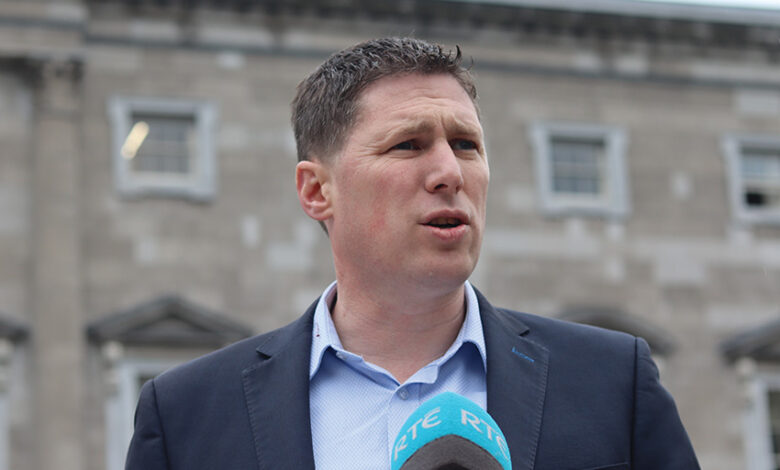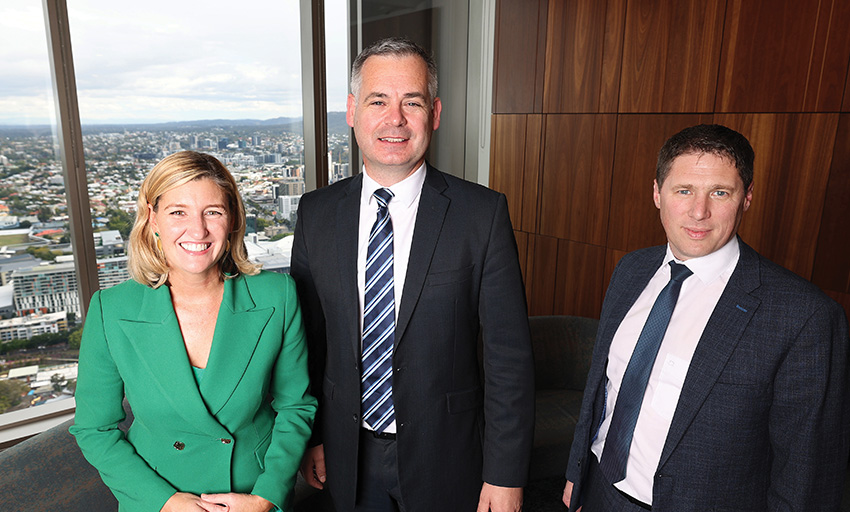Sinn Féin foreign affairs spokesperson Matt Carthy TD: ‘Independent foreign policy is not a weakness’

When Sinn Féin president Mary Lou McDonald TD reshuffled her front bench in April 2023, former MEP Matt Carthy was drafted from his agriculture portfolio to replace John Brady TD as the party’s spokesperson on foreign affairs and defence. In a year marked by major geopolitical conflagration and confusion, Ciarán Galway sits down with the TD for Cavan-Monaghan to tease out the ‘left republican’ worldview.
Having served as an MEP for the Midlands–North-West constituency from 2014 to 2020, Matt Carthy was subsequently elected to represent the Cavan-Monaghan constituency in Dáil Éireann when he secured Sinn Féin’s highest ever share of first preference votes in the February 2020 general election. Initially designated the party’s spokesperson for agriculture, food and the marine, where he was regarded as a capable asset, he was then moved sideways into the foreign affairs and defence remit.
Speaking about the move, he explains: “Obviously, Mary Lou’s reshuffle was about setting out our stall for government, setting out who she wants to lead us into government in terms of our priorities.
“I was very honoured to be asked to take on the role as spokesperson on foreign affairs and defence because I see it as critically important to Sinn Féin being successful in government.”
A major priority of any future Sinn Féin minister for foreign affairs, Carthy indicates, will be to build international support for the peace process, and also for Irish reunification. Simultaneously, he believes that Ireland has a positive and constructive role to play in international affairs.
“We should be very proud of the role that Ireland has historically played as a neutral country; as a country that has been seen very much as a champion for human rights, the rule of law, international fora, particularly the United Nations, and we can play a really positive role in terms of the future trajectory of international affairs.”
With regard to his priorities, the Sinn Féin frontbencher wants Ireland to be a country “at the heart of Europe”, while maintaining “an independent foreign policy” and military neutrality. He also wants Ireland to be perceived as a country that “involves itself in conflict resolution, as opposed to conflict participation”. To achieve this, he insists, Ireland must have Defence Forces “that are fit for purpose”.
Neutrality
Rejecting any criticism that Sinn Féin’s foreign policy amounts to isolationism, Carthy suggests it is, in fact, the opposite.
“There has been a strong effort made to almost rewrite Ireland’s role in the world,” he argues, adding: “It has never been one of isolationism going back to the foundation of the first Dáil. Ireland has been very outward looking in terms of international affairs, being a proponent for peace, playing a role in terms of international treaties around nuclear non-proliferation, and it has played a really constructive and valuable role, and one that I think we should be proud of, in terms of UN peacekeeping missions. Many of our Defence Forces personnel paid with their lives.
“We were also very one of the first countries to articulate the need to stand up to apartheid South Africa, the need for international pressure to come to bear.”
In this context, he contends, “it is regretful that Irish governments have moved away from playing that proactive role”.
Being neutral, therefore, in Sinn Féin’s view, does not preclude Ireland from establishing a position as to identifying the aggressor(s) in any single conflict, rather it is about using its influence to end conflict.
“[Ireland] is never going to have a powerful military force that would be able to invade or intervene directly in military conflicts, but what we have is the potential capacity to have a military force that can go into regions to uphold peace that can do things such as landmine clearance.
“I certainly would not ever cast having an independent foreign policy or neutrality as a weakness as some would, and I certainly would not describe it as isolationism. Actually, some of those who advocate abandoning neutrality are actually isolationist in the sense that they are looking at everything from the framework of a European perspective, where I would argue that Sinn Féin’s perspective is much broader than that.
“Obviously, there is a European dimension to it, which is very important because we are members of the European Union, something that we value. But our reach and potential go way beyond that, not least because of the fact that we have a very strong diaspora in very powerful countries in the world.”

Consultative Forum on International Security Policy
Discussing Sinn Féin’s attendance at each session of the Consultative Forum on International Security Policy, Carthy observes that while many of the debates were interesting and most of the dialogue was constructive, he remains critical of the format.
“Government purposely excluded the Opposition [parties] from any formal role. And it also denied a lot of alternative voices. There was very much a focus on those who had a particular view in terms of Irish neutrality and of the provisions that are in place to protect that. There was not enough emphasis on the positive and constructive role that Ireland has historically played.
“The debate was taking place almost without appreciation of the dire condition of our Defence Forces. We were talking about being part of all these potential alliances, engagements, or operations internationally, while we have Defence Forces numbers at historic lows, with more people leaving the defence forces than join in any given year.”
Another major criticism of the Consultative Forum articulated by the Sinn Féin defence spokesperson was the absence of a role for the representative organisations of the Defence Forces, which he contends was “a major gap”.
Ultimately, Carthy believes that the initiative was an attempt on behalf of government to “reshape public opinion as opposed to actually be a real public dialogue”. Instead, he suggests that there is a need for a major nationwide discussion on Ireland’s future role in the world, which would then be codified in Bunreacht na hÉireann.
“It would be very useful if we had a constitutional definition [of neutrality]. That would guide future governments in terms of setting the parameters for our involvement, particularly in military cooperation.
“I think there is a role for the public there. [Sinn Féin has] set out a trajectory that would see Citizens’ Assembly established with terms of reference that would outline what the principles of neutrality are. Its job would be to hear from all stakeholders, to discuss the issues, and to propose a wording that would allow Ireland to play a role in international fora. [This wording] would recognise our membership of the EU and the responsibilities that comes with that, recognise the need for Ireland to protect its own citizens abroad, but also protect our own skies and seas and to be a force for conflict resolution and peacebuilding in the world.”
“I certainly would not ever cast having an independent foreign policy or neutrality as a weakness as some would, and I certainly would not describe it as isolationism.”
Matt Carthy TD, spokesperson on foreign affairs and defence, Sinn Féin
Triple lock
Carthy is an advocate for retaining the triple lock mechanism for Defence Forces deployment on peacekeeping missions, despite the fact that any UN Security Council member can veto approval. “I find it ironic that those people who say that the triple lock gives others a blocking mechanism to Ireland’s participation. Often, they want to see us aligned to EU military structures, which would equally if not more so, bind us to the decisions of other member states.
“I also think it is important to understand that there has been virtually no UN peacekeeping mission that Ireland has wanted to participate in, that has been blocked. There was one in the late 1990s, that Chinese blocked for a period.
“There needs to be UN reform. I do not think any single country should have a veto at the UN. But I think the question needs to be asked, what would it do for Ireland’s reputation, if we were to involve ourselves in an international force that did not have UN approval?
“The UN is imperfect and has lots of flaws, but it is the only international forum to resolve conflicts and to determine breaches of international law, and to enforce international law when necessary. Those who advocate abandoning the triple lock, from an Irish perspective, are also abandoning the UN, as the as the primary international forum. That is really concerning, because I have not heard an alternative to the United Nations for all its flaws.”
Defence Forces
In July 2023, former Minister for Defence Willie O’Dea TD confirmed that Ireland has a long-standing arrangement with the British RAF to monitor Irish skies for suspicious aircraft. This type of arrangement, Carthy argues, is symptomatic of a failure to articulate the need to defend military neutrality by those who are supportive of it. Defending military neutrality, he outlines, means having Defence Forces which are adequately resourced and capable of doing what is asked of them.
Sinn Féin’s formal written submission to the Consultative Forum on International Security Policy, Neutrality a Cornerstone of Irish Foreign Policy, asserts: “We are unable to monitor, never mind defend, our skies and seas – and we are unable to adequately secure ourselves against modern threats.”
In practice, Carthy explains, this means that we must have a navy. “At the moment, we have a Naval Service with only two ships at sea at any given time. The primary challenge there is staffing levels. We need to get that right. We also have virtually no radar capacity and we are told that it could be 2028 before we do. We also have an Air Corps which is very low on [personnel], but also needs investment in terms of resources,” he observes.
Pointing to the report of the Commission on the Defence Forces and the accompanying High Level Action Plan, which establishes three tiers of ambition for the future of the Defence Forces, the Sinn Féin deputy remarks: “Having a political consensus means nothing unless you have a government that is willing to deliver, and this government has not been delivering. In fact, the situation has been getting worse under the current government in terms of numbers within the Defence Forces.”
Asked what his immediate defence priority would be if Sinn Féin entered government tomorrow, he identifies the Working Time Directive, which, according to the commission report, would expeditiously remove the blanket exclusion of the Defence Forces from the Organisation of Working Time Act 1997 subject to the application of the derogations permitted by the Working Time Directive.
“It is something that government said it is committed to yet there is no timeframe. My understanding is that there is going to be no provision in [Budget 2024]. Certainly, when we went seeking costs, from both the Department of Defence and the Department of Public Expenditure, NDP Delivery and Reform, they could give us none, because apparently nobody has decided to count the hours that the Defence Forces are currently working.
“We have been told by everybody in the Defence Forces, who we have spoken to, the single greatest initiative that government could take to resolve the retention crisis, but also in terms of future recruitment, is the application of the Working Time Directive. So that must be the number one thing,” he concludes.





